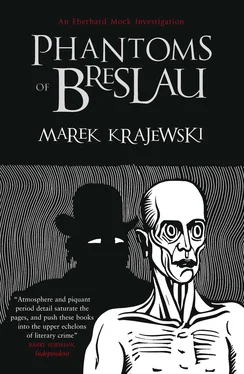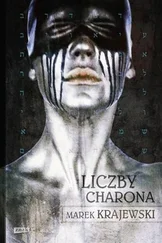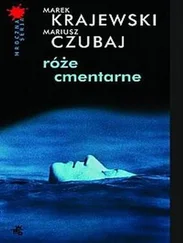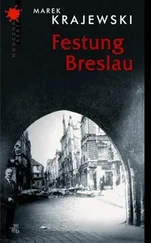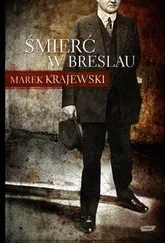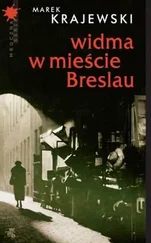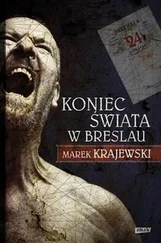Marek Krajewski - Phantoms of Breslau
Здесь есть возможность читать онлайн «Marek Krajewski - Phantoms of Breslau» весь текст электронной книги совершенно бесплатно (целиком полную версию без сокращений). В некоторых случаях можно слушать аудио, скачать через торрент в формате fb2 и присутствует краткое содержание. Жанр: Полицейский детектив, на английском языке. Описание произведения, (предисловие) а так же отзывы посетителей доступны на портале библиотеки ЛибКат.
- Название:Phantoms of Breslau
- Автор:
- Жанр:
- Год:неизвестен
- ISBN:нет данных
- Рейтинг книги:3 / 5. Голосов: 1
-
Избранное:Добавить в избранное
- Отзывы:
-
Ваша оценка:
- 60
- 1
- 2
- 3
- 4
- 5
Phantoms of Breslau: краткое содержание, описание и аннотация
Предлагаем к чтению аннотацию, описание, краткое содержание или предисловие (зависит от того, что написал сам автор книги «Phantoms of Breslau»). Если вы не нашли необходимую информацию о книге — напишите в комментариях, мы постараемся отыскать её.
Phantoms of Breslau — читать онлайн бесплатно полную книгу (весь текст) целиком
Ниже представлен текст книги, разбитый по страницам. Система сохранения места последней прочитанной страницы, позволяет с удобством читать онлайн бесплатно книгу «Phantoms of Breslau», без необходимости каждый раз заново искать на чём Вы остановились. Поставьте закладку, и сможете в любой момент перейти на страницу, на которой закончили чтение.
Интервал:
Закладка:
Cabby Warschkow stopped once more at the wharf of the Wollheim shipyard, alongside the Wodan which had been launched that day. The guests were just boarding the ship, where the rest of the festivities were to take place. Blood-like stains of wine remained on the tablecloths alongside yellowy spillages of beer. Chewed duck and goose bones were being swept into a bowl to form a crumpled skeleton, a funeral pyre of poultry. Mashed potatoes and beetroot — which only moments earlier had encircled ducks’ breasts, but now looked more like tubercular spittle — were being scraped off plates with a spoon. The September sun casting its benevolent light on this culinary battlefield revealed nothing, but did add radiance. The last of the revellers, unwilling to part with their bratwurst , were stepping onto the ship which was to sail up the Oder. Just as they were about to raise the gangway, one final passenger appeared: Eberhard Mock. Nobody asked for his invitation, nor was anyone surprised by his somewhat staggering gait.
Dancing couples occupied the upper deck as the orchestra played a foxtrot that was very much in vogue. Women wearing low-cut dresses, many decorated with strips of fabric slung low across their hips, leaned on the shoulders of their partners, moving swiftly with the dance. Elderly ladies stared through opera glasses; elderly gentlemen smoked, played skat or did both; younger men crowded around the gleaming bar and poured liquids of various colours down their fathomless throats from glasses, some of which — so Mock thought — had the coarse charm of cut prism, others the questionable refinement of a cone. Mock ordered a cognac and, without taking a sip, looked out at the iron spans of Posenerbrucke. Against its backdrop he caught sight of the man he had come to see — the river port director, Julius Wohsedt. Under what Mock was convinced was a fungal arm, he sheltered his wife and the ship’s godmother, the short and exceptionally corpulent Mrs Eleonore Wohsedt. Her husband was flushed with alcohol and dressed to the nines. He carried himself stiffly and formally, but had foregone his top hat. Mock burst out laughing at the sight of his sparse hair, which pomade had fashioned into an elaborate curl. He knocked back his cognac and silently toasted well-matched married couples.
The director felt alcohol-spiced breath on the triple folds of his neck. He turned to bestow a broad and sincere smile upon what he imagined would be one of his guests, and instead saw a dark-haired man he did not know. The man, who was of medium height and slightly overweight, was clenching his jaw and holding out a business card in gnarled fingers: CRIMINAL ASSISTANT EBERHARD MOCK, POLICE PRAESIDIUM, VICE DEPARTMENT IIIB. Wohsedt glanced at his wife, and Eleonore, registering the words “Vice Department” with a flicker of her eyes, moved away with a polite smile.
“One of your men,” said Wohsedt, reading the words on the business card, “has already been to see me today. Have you also come about those murdered sailors?”
“Yes, I’m leading the investigation,” Mock said, resting his hands on the polished railings. “I have to establish the identities of the victims.” He took a large envelope from his jacket pocket and handed it to Wohsedt. “Take another good look at them.”
Wohsedt flicked through the photographs carelessly. As he was sliding them back into the envelope, one of them caught his attention. He pulled them out again and considered every detail, turning them upside down and even examining the reverse sides. At length he sighed and returned the photographs to Mock.
“I don’t know them,” he said and wiped his sweaty head with a handkerchief. “I really don’t know them.”
“You don’t know them, sir,” Mock said quietly and clearly, “but maybe those working under you, your managers, your foremen, your caretakers — maybe they know them. Maybe the agents who recruit crews for river lines know something?”
“Do I have to ask all of them?” Wohsedt smiled at an elderly lady and lowered his voice. “Perhaps you’d like me to interrupt my negotiations with the striking workers, stop repairing ships and walk into my office every morning asking the question: ‘Does anybody know anything about the murdered sailors yet?’ Is that what I’m supposed to do?”
“Yes,” Mock said even more softly.
“Very well then,” Wohsedt said, yet again baring acrylic teeth. “That is what I shall do. When would you like me to report back to you?”
“In a week at the latest, sir.” Mock slipped the photographs into an envelope on which he had neatly written: “Tuberculosis of the skin after being bitten by someone with tuberculosis”.
BRESLAU, THAT SAME SEPTEMBER 1ST, 1919
SEVEN O’CLOCK IN THE EVENING
The cruise ship Wodan , having safely navigated the Burgerwerder and Sand locks, ploughed its way to the small landing stage opposite Sandinsel, at the foot of Holteihohe. Several passengers disembarked to climb the steep embankment, leaving behind the bright, dancing deck where brogues thumped and high heels clattered. Mock was among those leaving, tormented by a keen thirst and chaotic thoughts. His throat cried out for crystalline liquids, his mind for a clear breeze which would disperse the trails of mist and fog that shrouded his capacity for cause-and-effect analysis. He found relief in the garden of the Steamboat Landing Stage Restaurant near Sandbrucke. Admiring the edifice of the modern market hall, he relished a chilled glass of schnapps, which cut the taste of the Bismarck herrings whose silver skins were slashed with black criss-crosses. He divided a hot potato with his fork and slathered half of it with the soured cream coating the herrings. The fork impaled a piece of potato, then speared a slice of onion with a crunch before finally piercing a chunk of apple. In ecstasy Mock slid all these specialities into his mouth and chased them down with some more cold schnapps to stimulate his digestion. Next, he sucked down a long draught of Kulmbacher beer, then sprawled himself comfortably with his legs apart. Threads of gossamer brushed his cheeks and neck. He welcomed imminent drowsiness with warm hospitality. A tall, handsome man approached his table and sat down opposite him. He covered his ears with outstretched fingers through which the yellowish-red fluid began to flow; his ears were bleeding, his eyes were pouring out onto his sailor’s collar. Mock sprang to his feet, knocking into a waiter who was making his way towards two distinguished-looking ladies with some apple cake and glasses of brown liqueur. The waiter neatly tossed the tray from one hand to the other, spilling only a few drops which ran down the glasses’ slim stems.
Mock raised his bowler hat and apologized to the waiter and the two ladies, then turned to confront the spectre which had disturbed his sleep. In its place, a little sparrow was hopping around on the table, picking at what remained of the potato on his plate. Mock did not shoo it away. He rolled a cigarette of Georgian blond tobacco and lit it, listening to the chimes of the school chapel’s bells. Moments later the frightened bird flapping its wings in his heart had also calmed down. Mock’s thoughts and chain of logic became clearer: “The murderer commits a spectacular crime to force me to admit to some past mistake. Here one has to consider two things,” he explained to the sparrow hopping across the starched tablecloth. “Firstly, the singularity of the crime; secondly, my past mistake. The singularity of the crime might have gone unnoticed if the corpses had been discovered only later, in a decomposed state, after several months, for example. In that case, it would only have been noticeable to Doctor Lasarius and his men, who would find gouged eyes and broken bones even in a jelly of corpses. So why does the murderer count on his luck? But is it luck? Every day a large number of people cross Ottwitzer lock to the island and then continue on to Klein Tschansch. The bodies would certainly have been discovered, and news of the four murdered men would have gone round the whole district and then the entire city. Then there’s my past error, if one is to presume that the victims are there to illustrate the gravity of this error, accusing me through their very absurdity, then none of their characteristics have anything in common with me. The crime is little more than ostentation, form without content.”
Читать дальшеИнтервал:
Закладка:
Похожие книги на «Phantoms of Breslau»
Представляем Вашему вниманию похожие книги на «Phantoms of Breslau» списком для выбора. Мы отобрали схожую по названию и смыслу литературу в надежде предоставить читателям больше вариантов отыскать новые, интересные, ещё непрочитанные произведения.
Обсуждение, отзывы о книге «Phantoms of Breslau» и просто собственные мнения читателей. Оставьте ваши комментарии, напишите, что Вы думаете о произведении, его смысле или главных героях. Укажите что конкретно понравилось, а что нет, и почему Вы так считаете.
